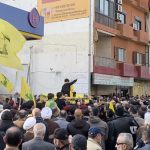On March 21, 2024, after spending ten days in occupied Palestine and then making another visit to Britain’s military base in Akrotiri, Cyprus, I travelled to Lebanon.
This is my third visit to Lebanon since the beginning of 2023.
My first visit to Lebanon occurred in March of last year. I came to Lebanon for the second time in October, shortly after Palestinian militants from the Gaza Strip attacked Israeli military bases and settlements surrounding the besieged enclave.
On each of my visits, I travelled to the Lebanese border with Israel and observed that tensions on the border had increased since the time of my prior visit.
Beaufort Castle (Qal’at ash-Shaqif)
Yesterday, I visited the Beaufort Castle in south Lebanon. The Castle, which is known in Arabic as Qal’at ash-Shaqif, lies near Lebanon’s southeastern border with Israel.
From the ruins of the Castle, the northern Israeli settlement of Metula is visible.
Metula lies at the northern tip of Israel. It has been struck repeatedly by Hezbollah since October 7. Metula is part of border region which the New York Times now describes as a “no-go zone” for Israelis. More than 60,000 Israelis have been evacuated from that zone and are being housed elsewhere in Israel, at considerable cost to Israel’s beleaguered government.
The Beaufort Castle is also near the predominantly Shia Muslim, Lebanese city of Nabatieh. Its estimated population is in excess of 100,000, making it the fifth largest city in Lebanon.
Located 717 meters above sea level, Beaufort Castle commands large parts of the Upper Galilee and South Lebanon. By the 1982 Lebanon war, it had become a symbol of Lebanese and Palestinian resistance to Israeli aggression. Yasser Arafat of the Palestinian Liberation Organization, and former Israeli Prime Ministers Menachem Begin and Ariel Sharon, visited Beaufort Castle before and after the battle of Beaufort Castle in June 1982.
Israel has repeatedly struck civilian targets in South Lebanon
While standing atop the summit of Beaufort Castle, I interviewed Lebanese journalist Hadi Hoteit. (My video interview of Hoteit appears at the end of this article.)
Hadi described to me recent attacks by Israeli forces on Nabatieh and the surrounding villages of south Lebanon. According to Hoteit, Israeli forces have repeatedly struck civilian targets in south Lebanon since October 7.
According to Lebanese and Israeli authorities, in the recent fighting, at least fifty-one civilians have been killed in Lebanon, compared to eight civilians killed in Israel. Israel acknowledges that fourteen of its soldiers have been killed by Hezbollah attacks, while Hezbollah’s website acknowledges the deaths of more than two hundred of its fighters.
During my interview of Hadi, we heard several explosions in the areas surrounding Beaufort Castle.
After visiting Beaufort Castle, Hadi and I travelled by vehicle to Nabatieh. There, we inspected two civilian structures destroyed by Israeli airstrikes within the past two months.
In one of those strikes, Israeli forces massacred a Lebanese family of six, including four children.
Since the 1982 Lebanon war, Israeli forces have bombed and shelled Nabatieh repeatedly, killing civilians there on multiple occasions.
According to Hadi, however, this war is different: whereas Israel readily launched ground incursions into Lebanon in the past, its army has refrained from doing so for the past five months – despite near-daily attacks from south Lebanon.
Hadi argues that Israel’s military leadership now fears Hezbollah as a result of the heavy casualties Israel’s army incurred in its disastrous 2006 invasion of south Lebanon.
Israel’s leadership must also weigh Hezbollah’s formidable arsenal of missiles, now estimated to exceed 130,000 projectiles. Its current arsenal is far larger and more sophisticated than the arsenal Hezbollah possessed during the 2006 Lebanon war.
You can watch and listen to my interview of Hadi here. My report also includes footage of destroyed infrastructure in Nabatieh:
-
[…] Israel has refrained from launching a ground invasion into South Lebanon. As I explained in this recent article, Israel’s reluctance to invade south Lebanon is highly […]






Thanks, Dimitri. And thanks to the people who help you: those who talk, those who translate, those who drive.